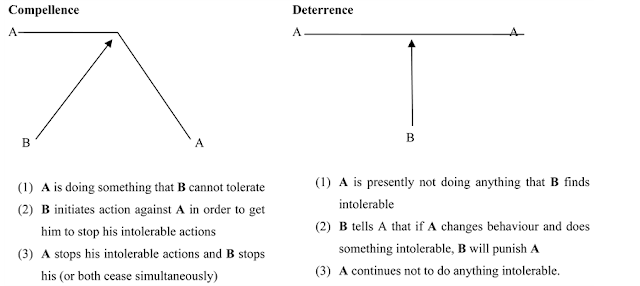In theory, three convenient approaches often applied to keep the peace are discernible in international relations. They are Military Power, Democracy, and Free Market. While the former is championed by realists, the latter two are postulated by political and economic liberationists, respectively. However, in practice, there is yet to be a consensus as to which of the approaches is the most practical.
By Osagioduwa Eweka
Institute of African Studies, University of Ibadan, Ibadan, Nigeria
In theory, three
convenient approaches often applied to keep the peace are discernible in
international relations. They are Military Power, Democracy, and Free Market.
While the former is championed by realists, the latter two are postulated by
political and economic liberationists, respectively. However, in practice, there
is yet to be a consensus as to which of the approaches is the most practical.
The goals that
nation states pursue vary considerably from case to case. This is also true
about the international community: events leading to the establishment of the
League of Nations soon after World War I to the establishment of the United
Nations after World War II have shown that there is a relationship between
force and foreign policy in an anarchic environment. These goals range from
economic to political; and are achievable through diverse means.
One common
thread that binds all these goals together is world peace. Military power is
more useful for realizing some goals than others, although it is generally
considered by some states for all of the goals that they hold remarkably on
occasions when diplomacy seems or has proven unrewarding. Suffice it to add
that the commonest means applied by the international community towards
achieving its goal of world peace is military power.
According to
Crocker (2007), in managing conflict, the use of force as well as military
power continue to play a vital role in maintaining global power balance and dealing
with regimes that refuse to abide by the international system. Four distinct
categories from Art (1989) analytically exhaust the functions that force can
serve as being defence, deterrence, compellence and swaggering. While the aim
of defence is to ward off attacks or minimize damage if attacked, deterrence is
meant to prevent adversary through threat of retaliation targeted at population
or industry of the adversary nation. While compellence involves deploying
military forces to be able to stop an adversary or get them to do something,
swaggering involves show of force, that is, pride of military might.
Remarkably, although defence and deterrence are alike in that they serve the
common purpose of dissuasion, self-protection and protection of others, they
can be independent of each other. Similarly, compellence is closely related to
deterrence save its relative vagueness. In the same vein, swaggering may serve
the purpose of deterrence in a passive way.
As a tool for
keeping the peace, military power can possibly be put to use principally in two
ways, either:
(i) physically-actual
deployment against adversary, usually but not always in a mutual exchange of
blows―or
(ii) peacefully-explicit
threat to resort to force, or to the implicit threat to use it that is
communicated simply by the party having it available for use. Apparently,
whereas “i” here-above boils down to compellence, “ii” boils down to
deterrence.
Source: Robert
J. Art (1989).
In a situation
where A sends a signal to B that A will revenge any act of aggression against
A, realists have argued that there will be a slim possibility for B to invade A
as B would always have at the back of its mind that there is the possibility
and ability for A to truly retaliate as well as the loss and cost of such
retaliation. Nevertheless, the first conspicuous scepticism attached to the
idea of the use of military in keeping the peace is that of viability and
sustainability. It is never sure ab initio that deterrence will work, and if
eventually it does, it may be unfeasible to sustain. This scepticism culminates
in the difficulty or even inability to verify the claim of realists that
deterrence indeed prevents wars even amidst seeming circumstances. For realists,
the lack of war is interpreted as successful deterrence while the outbreak of
same is analogous to failure of deterrence. While this may be true, what is
even truer is that it is a very difficult task to prove the actual success or
failure of deterrence strategies through its sheer (expected) outcome.
The limit of
military power in keeping the peace cannot be overemphasized. It straddles on
two platforms and culminates in failure to prevent wars. The first is
aggressiveness of power. Powers that are poised to accept the cost of
retaliation are known as aggressive powers, and such powers cannot be deterred.
Although this is an extremely rare case in international relations, yet
examples abound. A case in hand is that of Germany/Poland under NSDAP (the NAZI
regime). Adolf Hitler was ready to start a war in Europe regardless of actions
from the British or the French government, and to that effect, the conference
of Munich was futile for peacekeeping because, whatever the resolution, Hitler
would still have gone on with the war. In the same vein, threats from Britain,
France and other nations did not deter him. Rare as this kind of situation may
seem in contemporary times, particularly in international relations, it happens
to be a gap now filled by terrorists especially since the wake of the
twenty-first century. Military power and/or deterrence is bound to fail in
keeping the peace in a suicide bombing situation. It is unimaginable to face a
suicide bomber and threaten to kill them if they pull the trigger. Of course,
the terrorist in question must be sure and ready to die. So, terrorism is one
political action that cannot be deterred by mere aggressive action. The second
platform on which the limit of military power in keeping the peace straddles is
proactive attack. Powers convinced of the ever readiness of attacks from their
adversaries cannot be deterred. The logic is that such powers would seek to
attack first in order to have the war started on their own terms and, in other
cases, in an attempt to disarm their adversaries. When the situation of war is
so tight that its prevention is unfeasible, an aggressive power is dissuadable,
thus military power becomes impotent in keeping the peace. The attack on Pearl
Harbour (Hawaii), 1941, exemplifies this point. Although Japan was militarily
unprepared for a war with the United States of America, which explains their
(Japan’s) defeat in the war, Japan was very much unmistakably aware that the US
might launch an attack against them at any moment. Another more recent instance
would be the Sino-Indian border conflict of 1962 which resulted from China’s
influence on or claim of Tibet. For China, pre-war events presupposed that the
war was imminent with Indian forces and as such China launched a proactive
attack which they presumed to be strategically advantageous.
In addition to
the above, the possibility of accepting status quo may also be a limit of
military power in keeping the peace. This is also partitioned into two strap
lines notably perceived imminence of attack and attack as last resort. The
perceived imminence of attack is exemplified in a case where a nation state,
for the paranoia of possible attacks from another, decides to embark on a
pre-emptive attack; of course, the action will not be deterred. One remarkable
fact about perceived imminence of attack is that the more it is heightened, the
less there is a possibility for a successful deterrence. Similarly, when a
government sees attack as last resort, there is less possibility for such
government to accept status quo, and therefore, deterrence might breakdown. The
aforesaid are arguably attributable to two basic factors being vague warning
signs and mingling of warning signs. Where warning signs sent by a deterring
party are unclear or practically vague rather than precise, comprehensible and
decisive, the proposed action is bound to be likewise unclear, and as such, the
adversary may interpret it as a mere threat or sheer lack of capacity of the
deterring party to carry-out the threat of retaliation. Similarly, mingling
signs have to do with the deterring party presenting more than one threat to
the adversary, thus the latter may capitalize on the least aggressive of all
the multiple warning signs put forth by the former and launch aggression.
About The
Author:
Osagioduwa Eweka,
Peace and Conflict Studies Programme, Institute of African Studies, University
of Ibadan, Ibadan, Nigeria
Publication
Details:
This article is
an extract from a research paper titled - Exploring Essentials for Keeping the
Peace by Osagioduwa Eweka | Open Journal of Political Science / Vol.06
No.01(2016), Article ID:62567,15 pages DOI: https://dx.doi.org/10.4236/ojps.2016.61003 / Download The Paper - LINK
Copyright © 2016
by authors and Scientific Research Publishing Inc.This work is licensed under
the Creative Commons Attribution International License (CCBY).





















